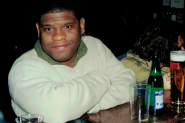Anita Desai | Fasting Feasting
16. May 2012 15:01
-petr-machan,-pwf-(4)-4fb3a7099f84a_360x226.jpg) MamaandPapa. MamaPapa. PapaMama. It was hard to believe they had ever had separate existences, that they had been separate entities and not MamaPapa in one breath. Yet Mama had been born to a merchant family in the city of Kanpur and lived in the bosom of her enormous family till at sixteen she married Papa. Papa, in Patna, the son of a tax inspector with one burning ambition, to give his son the best available education, had won prizes at school meanwhile, played tennis as a young man, trained for the bar and eventually built up a solid practice. This much the children learnt chiefly from old photographs, framed certificates, tarnished medals and the conversation of visiting relatives. MamaPapa themselves rarely spoke of a time when they were not one. The few anecdotes they related separately acquired great significance because of their rarity, their singularity.
MamaandPapa. MamaPapa. PapaMama. It was hard to believe they had ever had separate existences, that they had been separate entities and not MamaPapa in one breath. Yet Mama had been born to a merchant family in the city of Kanpur and lived in the bosom of her enormous family till at sixteen she married Papa. Papa, in Patna, the son of a tax inspector with one burning ambition, to give his son the best available education, had won prizes at school meanwhile, played tennis as a young man, trained for the bar and eventually built up a solid practice. This much the children learnt chiefly from old photographs, framed certificates, tarnished medals and the conversation of visiting relatives. MamaPapa themselves rarely spoke of a time when they were not one. The few anecdotes they related separately acquired great significance because of their rarity, their singularity.
Mama said, 'In my day, girls in the family were not given sweets, nuts, good things to eat. If something special had been bought in the market, like sweets or nuts, it was given to the boys in the family. But ours was not such an orthodox home that our mother and aunts did not slip us something on the sly.' She laughed, remembering that — sweets, sly.
Papa said, 'We did not have electricity when we were children. If we wanted to study, we were sent out to sit under the streetlight with our books. During the examinations, there would be a circle of students sitting and reciting their lessons aloud. It would be difficult to concentrate on law because others were reciting theorems or Sanskrit slokas or dates from British history. But we did it — we passed our exams.'
Papa said, 'The best student in my year studied day and night, day and night. We found out how he could study so much. During the exams, he cut off his eyelashes. Then, whenever his eyes shut, they would prick him and he would wake up so he could study more.'
Papa's stories tended to be painful. Mama's had to do with food — mostly sweets — and family. But the stories were few, and brief. That could have been tantalising — so much unsaid, left to be imagined - but the children did not give the past that much thought because MamaPapa seemed sufficient in themselves. Having fused into one, they had gained so much in substance, in stature, in authority, that they loomed large enough as it was; they did not need separate histories and backgrounds to make them even more immense.
Sometimes one caught a glimpse of what they had been like before they were joined together in their Siamese twin existence on the veranda swing. At times Uma was astonished, even embarrassed by such a glimpse - for instance, of Mama playing a game of rummy with her friends which she did surreptitiously because Papa had a highminded disapproval of all forms of gambling. When Mama went across to the neighbours' for a morning game, she did not quite lift her sari to her knees and jump over the hedge but somehow gave the impression of doing so. Her manner — along with the curious patter that went with the game — became flirtatious, girlish. Her cheeks filled out plumply as she stuffed in the betel nuts and leaves she was offered — another indulgence frowned upon by Papa — her eyes gleamed with mischief as she tossed back her head and laughed apparently without any thought of propriety. She clasped the cards to her chest and fluttered her lashes coquettishly. If Uma hung over her shoulders to look or Aruna edged closer to see why she seemed so delighted with her hand of cards, she swatted at her daughters as if they were a pair of troublesome flies. 'Go. Go play with your friends.'
Then she would come back to lunch, picking her way through a gap in the hedge, her daughters trailing after her, and by the time she arrived at the veranda, her manner had become the familiar one of guarded restraint, censure and a tired decorum.
When Papa, back from his office, asked what they had done with themselves all morning, she drooped, sighing, and fanned herself, saying, 'It was so-o hot, what can one do? Nothing.'
As for Papa, he never became less like himself, only more so. Calling for the driver to bring the car round in the morning, he got in with an air of urgency that suggested any delay could cause an explosion. If they ever had occasion to go to the office to fetch him, he would be sitting at an immense desk like the satrap of some small provinciality, mopping his neck with a large handkerchief, giving curt orders to his secretary,
his typist and his clients, every gesture and grimace adding to the carapace of his authority till it encased him in its dully glinting lead.
Mama would carefully pack his tennis kit and send it across to him with the office peon who had come for it on his bicycle. Pinning the bag under a metal clamp, he would pedal away. Mama would watch him turn out of the gate, onto the road, deep in thought.
Uma wondered if she pictured Papa changing into it in his office, behind the green oilcloth screen that stood across one corner. She put her fingers to her mouth to suppress a giggle.
Then Mama would sit herself down on the veranda swing, alone, to wait for him, keeping a cursory eye on the little girls as they played in the dry patch of grass where they were laying out a garden of pebbles, leaves, twigs and marigold petals. She intervened irritably when they quarrelled too loudly.
Afternoon dwindled to hazy evening and finally the car drove up. Papa jumped out and came up the steps to the veranda with a bound, swinging his racquet. He was dressed in the white cotton shorts Mama had sent him, their wide legs flapping about his thin shanks. The metal buckles had made rust marks at the waist. She often scolded the washerman for bringing back the shorts with rust marks from the wash. She also scolded him for breaking the large white buttons that she then had to replace, spectacles on her nose, thin-lipped with concentration. Papa also wore a short-sleeved white shirt with a green or blue trim. He gleamed with effort and achievement and perspiration. 'Beat Shankar six—five, six—two,' he reported as he strode past them on his way to his dressing room, his cotton socks collapsing, exhausted, round his ankles. They heard him throw down his racquet with a pleased groan.
None of them spoke on the veranda. Mama sat as if stunned by his success, his prowess. Then they heard a bucket clanking, water sloshing. A stream of soapy water crept out of a drain in the side of the house and pushed past dry leaves and dust to end in a pool of slime under the basil and jasmine bushes. The girls stared.
Rousing herself, Mama called, 'Uma! Uma! Tell cook to bring Papa his lemonade!'
Uma ran.





-6507dcf8af9e0_160x60.jpg)
